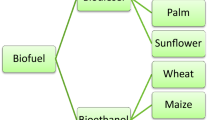Abstract
The present research involves the selection of suitable edible and non-edible feedstocks for the production of biodiesel in Pakistan. After studying and analyzing different feedstocks: Jatropha, Neem and waste cooking oil is selected due to their availability and low free fatty acid contents which is almost less than 30%, for techno-economic analysis. The transesterification process is applied for the conversion of these edible and non-edible feedstocks into biodiesel. Three projects have been chosen in which 1000L biodiesel can be generated. According to data obtained from different resources, the initial investment of Neem, Jatropha and waste cooking oil projects are $14,183, $13,883, and $12,183. After calculating the initial project investment, different capital investment techniques are calculated such as internal rate of return, profitability index and payback period. Feasibility analysis is done that shows, which project, should be adopted according to prevailing circumstances. The project with a short payback period is chosen for investment. Therefore, by doing techno-economic analysis of these three oils for the production of biodiesel and after that compare it with the petrol-diesel, one can enhance the research capability and productivity of biodiesel in Pakistan.
Access this chapter
Tax calculation will be finalised at checkout
Purchases are for personal use only
Similar content being viewed by others
References
Barnwal BK et al (2005) Prospects of biodiesel production from vegetable oils in India. Renew Sustain Energy Rev 9(4):363–378. https://doi.org/10.1016/j.rser.2004.05.007
Khan A et al (2009) Prospect of biodiesel in Pakistan. Renew Sustain Energy Rev 13(6–7):1576–1583. https://doi.org/10.1016/j.rser.2008.09.016
Yaqoob H et al (2021) Jatropha curcas biodiesel: a lucrative recipe for Pakistan’s energy sector. Processes 9(7):1–36. https://doi.org/10.3390/pr9071129
Ma F et al (1999) Biodiesel production: a review1journal series #12109, agricultural research division, institute of agriculture and natural resources, University of Nebraska-Lincoln. 1. Biores Technol 70(1):1–15. https://doi.org/10.1016/s0960-8524(99)00025-5
Noreen F, Akbar A, Ahmed Z, Asghar N, Iqbal A (2020) A purposed business model of manufacture , marketing and contingency plan of a green spectro bio-diesel company at a purposed business model of manufacture , marketing and contingency plan of a green spectro bio-diesel company at district Sialkot, Punjab
Chakrabarti MH et al (2012) Status of biodiesel research and development in Pakistan. Renew Sustain Energy Rev 16(7):4396–4405. https://doi.org/10.1016/j.rser.2012.03.064
Joshi S et al (2019) Techno-economical and experimental analysis of biodiesel production from used cooking oil. BioPhysical Econ Resour Qual 4(1):1–6. https://doi.org/10.1007/s41247-018-0050-7
Quintero A et al (2012) Social and techno-economical analysis of biodiesel production in Peru. Energy Policy 43:427–435. https://doi.org/10.1016/j.enpol.2012.01.029
Axelsson L et al (2012) Perspective: Jatropha cultivation in southern India: Assessing farmers’ experiences. Biofuels Bioprod Biorefin 6(3):246–256. https://doi.org/10.1002/bbb
Ivanova N, Gugleva V, Dobreva M, Pehlivanov I, Stefanov S, Andonova V (2016) We are IntechOpen, the world’s leading publisher of open access books built by scientists , for scientists TOP 1%,” Intech, vol I, p 13; no. tourism
Aslam K, Mushtaq A, Nadeem F, Ben Ghnia J, Rafique M (2020) Economic feasibility of non-edible oils as biodiesel feedstock : a brief review economic feasibility of non-edible oils as biodiesel feedstock : a brief review
Ondruschat B (2020) Biodiesel production technology. Catalysis from A to Z, no. July, 2020. https://doi.org/10.1002/9783527809080.cataz01943
Khounani Z et al (2020) Unlocking the potential of walnut husk extract in the production of waste cooking oil-based biodiesel. Renew Sustain Energy Rev 119:109588. https://doi.org/10.1016/j.rser.2019.109588
Oke EO et al (2021) Heterogeneously catalyzed biodiesel production from Azadiricha Indica oil: Predictive modelling with uncertainty quantification, experimental optimization and techno-economic analysis. Bioresour Technol 332:125141. https://doi.org/10.1016/j.biortech.2021.125141
Riayatsyah TMI et al (2021) Biodiesel production from reutealis trisperma oil using conventional and ultrasonication through esterification and transesterification. Sustainability (Switzerland) 13:6. https://doi.org/10.3390/su13063350
Seeds FNP (2021) Familiar non-edible plants seeds †, pp 1–22
Ameen M, Zafar M, Ahmad M, Shaheen A, Yaseen G (2018) Wild melon: a novel non-edible feedstock for bioenergy. Pet Sci 15(2):405–411. https://doi.org/10.1007/s12182-018-0227-0
Zhang Y et al (2003) Biodiesel production from waste cooking oil: 2. Economic assessment and sensitivity analysis. Biores Technol 90(3):229–240. https://doi.org/10.1016/S0960-8524(03)00150-0
Ali et al (2020) Investigating biodiesel production strategies as a sustainable energy resource for Pakistan. J Clean Prod 259:120729. https://doi.org/10.1016/j.jclepro.2020.120729
Author information
Authors and Affiliations
Corresponding author
Editor information
Editors and Affiliations
Rights and permissions
Copyright information
© 2024 The Author(s), under exclusive license to Springer Nature Singapore Pte Ltd.
About this paper
Cite this paper
Rahman, A.A. et al. (2024). Techno-Economic Analysis of Different Routes to Produce Biodiesel. In: Trong Dao, T., Hoang Duy, V., Zelinka, I., Dong, C.S.T., Tran, P.T. (eds) AETA 2022—Recent Advances in Electrical Engineering and Related Sciences: Theory and Application. AETA 2022. Lecture Notes in Electrical Engineering, vol 1081. Springer, Singapore. https://doi.org/10.1007/978-981-99-8703-0_56
Download citation
DOI: https://doi.org/10.1007/978-981-99-8703-0_56
Published:
Publisher Name: Springer, Singapore
Print ISBN: 978-981-99-8702-3
Online ISBN: 978-981-99-8703-0
eBook Packages: Intelligent Technologies and RoboticsIntelligent Technologies and Robotics (R0)




